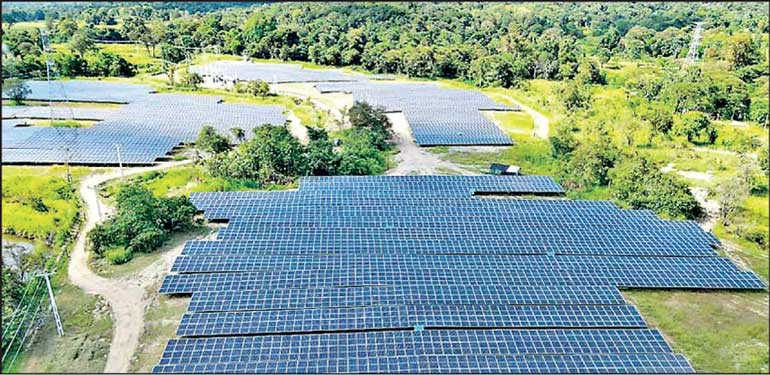Wednesday Feb 25, 2026
Wednesday Feb 25, 2026
Saturday, 10 May 2025 00:50 - - {{hitsCtrl.values.hits}}

Sri Lanka’s solar industry is warning of a looming collapse in renewable energy development if urgent reforms are not made to the country’s energy policy framework. In a powerful submission to the Public Utilities Commission (PUCSL), the Solar Industries Association (SIA) has outlined a raft of challenges that it says are crippling investor confidence, destabilising the sector, and threatening tens of thousands of jobs.
“Sri Lanka has successfully commissioned over 1.5 GWp of solar PV capacity, contributing billions of rupees in avoided energy costs. However, the current policy environment presents significant threats to the sector’s viability and growth,” the submission notes.
At the heart of the issue is a series of flawed regulatory decisions and what the industry describes as “unprofessional” recommendations being submitted to policymakers.
According to the SIA, recent Cabinet papers were based on misleading data, including inflated assumptions about plant load factors. The industry insists real-world solar performance ranges between 13-14%—yet official models continue to assume 16%, undermining tariff calculations and deterring new investment.
“There is no premium for investors. The disparity in rates between rooftop and ground-mounted solar is arbitrary and unjustified,” they claimed.
They added that rooftop solar, which provides 88% of Sri Lanka’s total solar generation, is being penalised despite its cost-effectiveness and societal value.
The submission also alleges that progressive elements of the new Electricity Act, passed in 2024 to fast-track renewable adoption, are now under threat.
They opined that the Power Ministry Secretary has reportedly acknowledged a policy shift aimed at slowing down renewable energy development.
The SIA claims this shift is evidenced by the recent approval of a second LNG plant, based on “false assumptions” that contradict least-cost generation principles.
They asserted that the operational challenges are compounding the crisis. Solar developers report facing uncontracted curtailments, instances where the grid operator restricts electricity output—without any compensation. “We propose situational tariff incentives for curtailments, enabled through existing metering technologies. An audit of curtailment data is urgently needed,” they stressed.
The SIA said battery tariffs must be introduced across scales—small, medium, industrial to support grid inertia and peak demand d, especially during peak demand. “Storage must be seen as essential infrastructure, not optional,” the submission argues.
The lack of smart metering, delays in power wheeling implementation, and impractical inverter setting deadlines are further hampering project viability. “Immediate introduction of smart meters is critical for demand-side management and grid visibility. Impractical timelines for inverter modifications must be revised and a minimum of four months should be allowed, considering firmware and safety constraints,” the industry insists.
The Association reiterated that frequent and unsubstantiated changes in tariffs undermine investor confidence and financial planning.
They said the consequences are already being felt. The SIA warns that a proposed reduction in feed-in tariffs would wipe out the SME-led solar sector and trigger a loss of an estimated 40,000 jobs.
Over 100,000 rooftop installations, many owned by middle-income households are at risk of becoming “financially unviable”.
They also pointed out that investor confidence has taken a severe hit. “Unlimited curtailment clauses and uncertainty around the Net Plus scheme have made projects unbankable, while clearances for new rooftop solar systems are being withheld stalling growth,” they added.
To make matters worse, SIA said they were battling public misinformation. “The industry has been wrongly blamed for the island-wide blackout on 9 February 2025, despite no factual evidence’ to support the accusation,” they added.
The submission ends with a series of urgent calls to action, which include; revising and rationalising the tariff model based on accurate PLF and financial assumptions, ensuring transparency in policy-making and protecting progressive legislation, reinstating the successful Net Plus Plus scheme, mandating compensation for curtailment, modernising grid infrastructure and establishing a stable and predictable policy framework.
“We urge the Commission to take swift and decisive action to protect this vital industry. Solar energy is not only key to Sri Lanka’s energy security and economic recovery, but also a symbol of sustainable development and public empowerment,” SIA added.